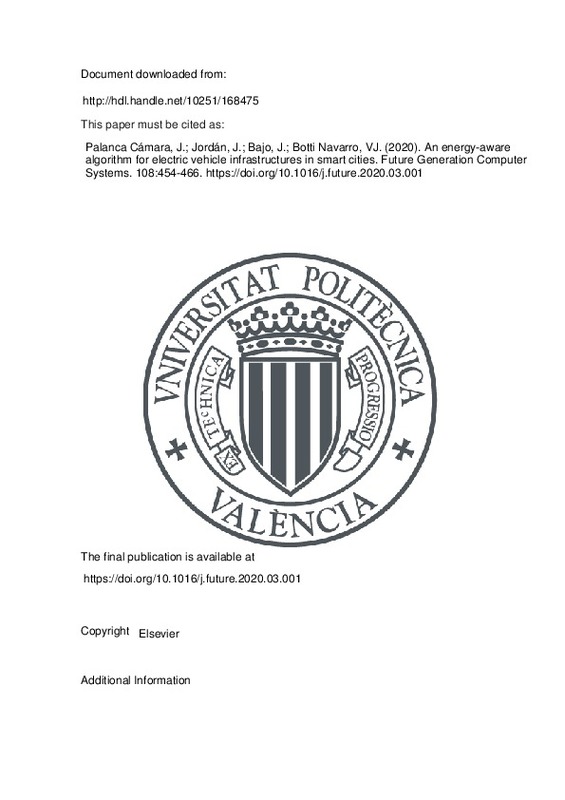Gan, L., Topcu, U., & Low, S. H. (2013). Optimal decentralized protocol for electric vehicle charging. IEEE Transactions on Power Systems, 28(2), 940-951. doi:10.1109/tpwrs.2012.2210288
Ma, T., & Mohammed, O. A. (2014). Optimal Charging of Plug-in Electric Vehicles for a Car-Park Infrastructure. IEEE Transactions on Industry Applications, 50(4), 2323-2330. doi:10.1109/tia.2013.2296620
Needell, Z. A., McNerney, J., Chang, M. T., & Trancik, J. E. (2016). Potential for widespread electrification of personal vehicle travel in the United States. Nature Energy, 1(9). doi:10.1038/nenergy.2016.112
[+]
Gan, L., Topcu, U., & Low, S. H. (2013). Optimal decentralized protocol for electric vehicle charging. IEEE Transactions on Power Systems, 28(2), 940-951. doi:10.1109/tpwrs.2012.2210288
Ma, T., & Mohammed, O. A. (2014). Optimal Charging of Plug-in Electric Vehicles for a Car-Park Infrastructure. IEEE Transactions on Industry Applications, 50(4), 2323-2330. doi:10.1109/tia.2013.2296620
Needell, Z. A., McNerney, J., Chang, M. T., & Trancik, J. E. (2016). Potential for widespread electrification of personal vehicle travel in the United States. Nature Energy, 1(9). doi:10.1038/nenergy.2016.112
Franke, T., & Krems, J. F. (2013). Understanding charging behaviour of electric vehicle users. Transportation Research Part F: Traffic Psychology and Behaviour, 21, 75-89. doi:10.1016/j.trf.2013.09.002
Shukla, A., Pekny, J., & Venkatasubramanian, V. (2011). An optimization framework for cost effective design of refueling station infrastructure for alternative fuel vehicles. Computers & Chemical Engineering, 35(8), 1431-1438. doi:10.1016/j.compchemeng.2011.03.018
Nie, Y. (Marco), & Ghamami, M. (2013). A corridor-centric approach to planning electric vehicle charging infrastructure. Transportation Research Part B: Methodological, 57, 172-190. doi:10.1016/j.trb.2013.08.010
Tu, W., Li, Q., Fang, Z., Shaw, S., Zhou, B., & Chang, X. (2016). Optimizing the locations of electric taxi charging stations: A spatial–temporal demand coverage approach. Transportation Research Part C: Emerging Technologies, 65, 172-189. doi:10.1016/j.trc.2015.10.004
Dong, J., Liu, C., & Lin, Z. (2014). Charging infrastructure planning for promoting battery electric vehicles: An activity-based approach using multiday travel data. Transportation Research Part C: Emerging Technologies, 38, 44-55. doi:10.1016/j.trc.2013.11.001
He, J., Yang, H., Tang, T.-Q., & Huang, H.-J. (2018). An optimal charging station location model with the consideration of electric vehicle’s driving range. Transportation Research Part C: Emerging Technologies, 86, 641-654. doi:10.1016/j.trc.2017.11.026
Jordán, J., Palanca, J., del Val, E., Julian, V., & Botti, V. (2018). A Multi-Agent System for the Dynamic Emplacement of Electric Vehicle Charging Stations. Applied Sciences, 8(2), 313. doi:10.3390/app8020313
Jurdak, R., Zhao, K., Liu, J., AbouJaoude, M., Cameron, M., & Newth, D. (2015). Understanding Human Mobility from Twitter. PLOS ONE, 10(7), e0131469. doi:10.1371/journal.pone.0131469
Deb, K., Pratap, A., Agarwal, S., & Meyarivan, T. (2002). A fast and elitist multiobjective genetic algorithm: NSGA-II. IEEE Transactions on Evolutionary Computation, 6(2), 182-197. doi:10.1109/4235.996017
Coello Coello, C. A. (2002). Theoretical and numerical constraint-handling techniques used with evolutionary algorithms: a survey of the state of the art. Computer Methods in Applied Mechanics and Engineering, 191(11-12), 1245-1287. doi:10.1016/s0045-7825(01)00323-1
[-]







![[Cerrado]](/themes/UPV/images/candado.png)


